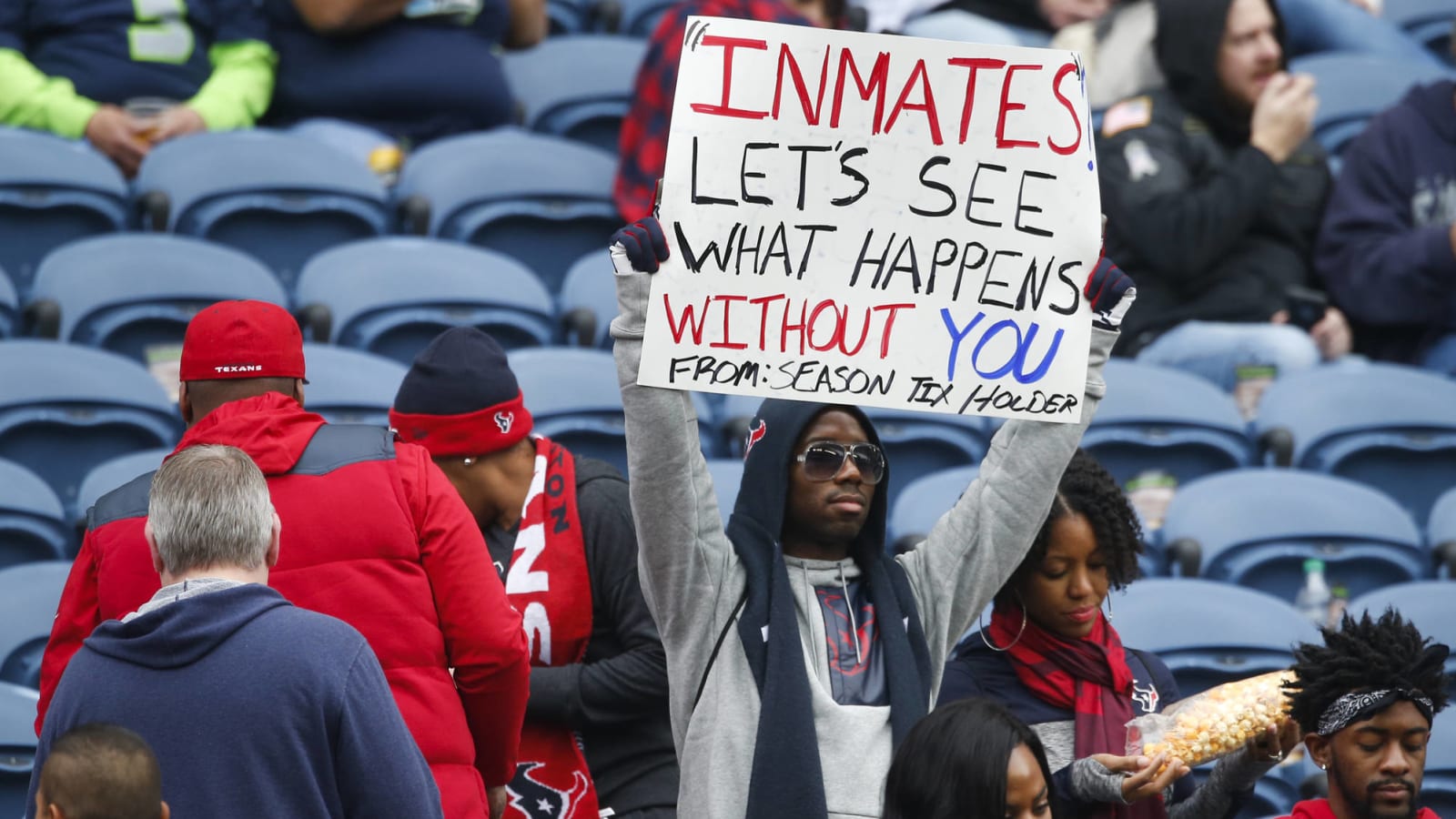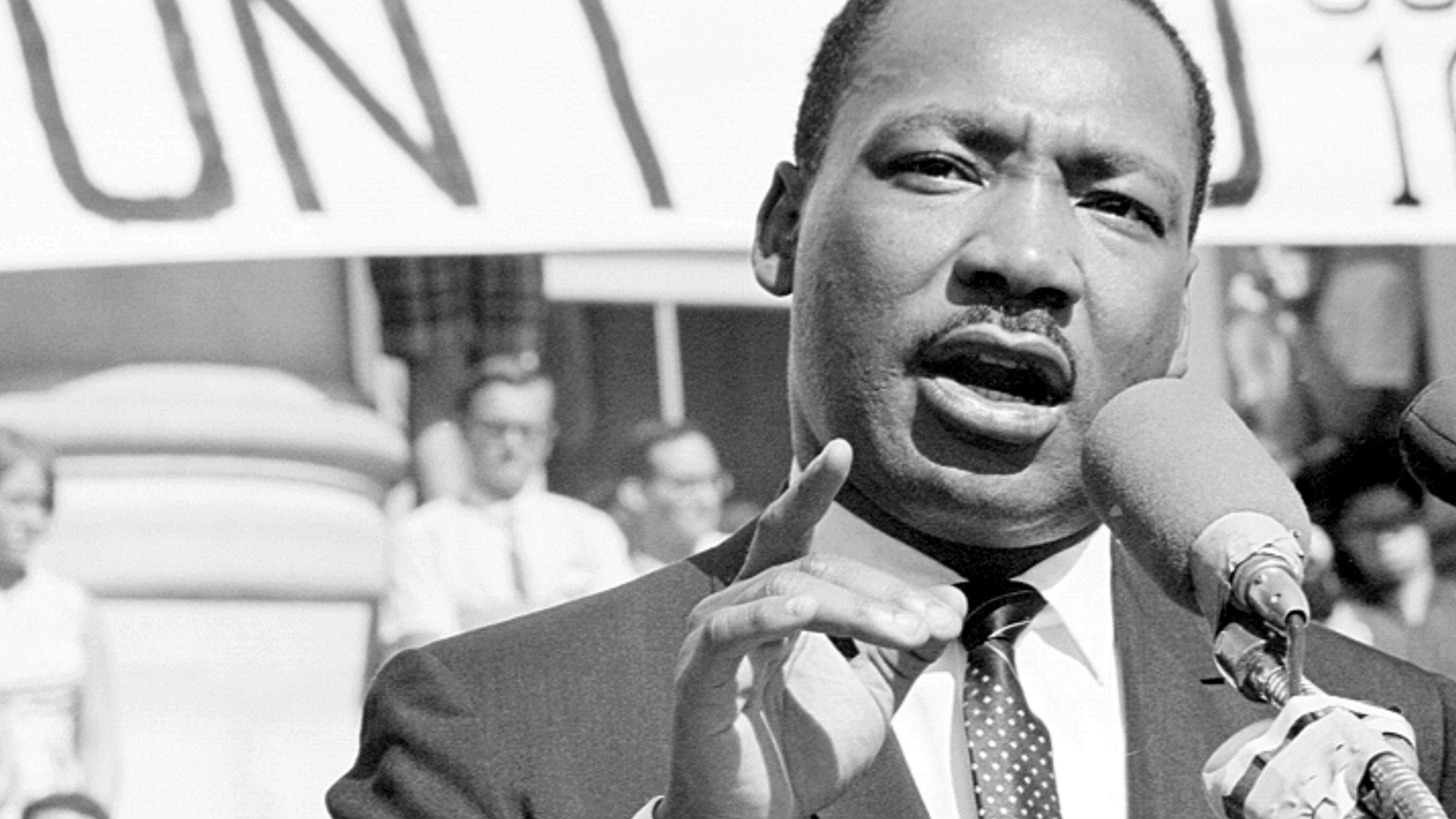
Sports & Politics: Texans owner 'sorry not sorry' over remarks
"We can't have the inmates running the prison." - Bob McNair, Houston Texans owner
Nearly five months after issuing an apology for a comment made during a meeting between NFL team owners and players that was published in an ESPN the Magazine feature story, Houston Texans owner Bob McNair told the Wall Street Journal Thursday that he didn't actually mean it.
"The main thing I regret is apologizing," McNair said. "I really didn't have anything to apologize for."
McNair's comment, italicized and bolded above, was made during a November 2017 gathering set up to specifically to discuss players protesting during the national anthem to raise awareness to racial inequality and police brutality. The general assumption was that McNair equated the league's players, who are predominantly black, to prison inmates. There was immediate backlash. The following Sunday, in an away game against Seattle, the majority of the Texans' players kneeled in protest. Pro Bowl tackle Duane Brown took it further, alleging in an interview that McNair has a history of making racially charged comments.
McNair quickly apologized and met with the team, though it should be noted that his mea culpa maintained that his comments were misconstrued, saying then as he does now that it was the owners who were the inmates in his statement.
In addition to his retraction, McNair also told the WSJ that he has been unfairly maligned and insisted that he isn't racist, pointing out that he anonymously paid for the funerals of the victims killed in the 2015 shooting of the Emanuel African Methodist Episcopal Church in Charleston, S.C. He also took shots at Brown, who was traded to the Seahawks shortly thereafter, calling the tackle a “troublemaker.”
Despite still being in the offseason, the issue of national anthem protests appears like it'll still be a hot button issue in the NFL this upcoming season again. To wit, the Texans recently denied a report claiming that the team was not looking at free agents who kneeled during the national anthem. It's also worth mentioning that McNair's takeback coincides with the questioning of members of the Baltimore Ravens for Colin Kaepernick's collusion case against the NFL. The free agent quarterback alleges NFL owners conspired to keep him off a roster because of his politics.
And speaking of the Ravens and free agent quarterbacks who didn't play last season, the team just announced that it has signed Robert Griffin III, who last played in 2016 for the Cleveland Browns, to its roster, giving even more fuel to the argument Kaepernick is unfairly being kept out of the league.
Need to know now:
State house: MSU failed to protect student-athletes from Nassar - In a review of a 2010 performance appraisal, former students and colleagues of William Stampel – who was charged with neglect of duty in his supervision of Nassar – spoke often of crude and inappropriate behavior. Separately, Michigan State “failed to adequately protect students and patients on campus," according to an inquiry from the Michigan House of Representatives. Meanwhile, the school’s new marketing campaign is an attempt to fight back against scandal through the power of fan loyalty.
NBA 2K league becomes the Association’s “fourth brand” - The inaugural NBA 2K League Draft had nearly all the trappings of the NBA Draft, including one team selecting its own LeBron James. Presided over by Adam Silver, the NBA commissioner says the league sees its esports players as athletes. That already means more scrutiny with the fact that they will make more money than players in the G League (and nearly as much as some WNBA players do in the U.S.). It also means that the league will have to address concerns about gender diversity in esports.
Maddon’s hometown a haven for immigrants - Chicago Cubs manager Joe Maddon spoke about his support of the Hazelton (Pennsylvania) Integration Project, which helps immigrant families adjust to a new world while also easing anti-immigrant hostilities in the town.
The Expos’ logo lives on (as well as Montreal’s MLB dreams) - Thirteen seasons after the Montreal Expos became the Washington Nationals, the beloved “M” (and “e” and “b”) has one of the most fascinating afterlives of a sports logo ever. Meanwhile, Montreal mayor Valerie Plante has started talks with local business leaders to bring baseball back to the city, as well as a new NBA team.
Covering women’s sports boosts popularity - On the heels of a thrilling Women’s Final Four, strong women’s national teams in soccer and hockey, and the upcoming WNBA season, the HuffPost op-ed from Jessica Luther lays down a simple formula: more media coverage of women’s sports leads to their increased popularity.
How the Raiders got comfortable with betting - In exploring the pending move to Las Vegas, Oakland Raiders owner Mark Davis had a secret meeting at UNLV back in 2015 that placated his fears about the impact of legalized gambling on the NFL. Fast-forward three years and more states are getting cozy to it as well, from Illinois to Louisiana to Rhode Island.
Former NFL players claim they are not receiving concussion payments - A number of former NFL players have filed legal briefs against the league for what they feel amounts to stalling on payments owed to them from the $1 billion concussion settlement.
Sumo tradition of barring women from ring under fire - In Tokyo, a referee shooed women away from the ring as they attempted to save the life of a politician who was speaking before a sumo match. The video of the incident has sparked international reaction.
Black golfers are the minority, even at HBCUs - Want to know why there hasn’t been a line of black golfers trailing behind Tiger Woods? Look to the HBCUs (historically black colleges and universities), where African-Americans are outnumbered on their own teams compared to international and white American players.
Trials and tribulations for Native American youth athletes - Three teams with mostly Native American players were expelled from the Dakota Premier Lacrosse League after their members reported racial abuse. In Montana, a state championship basketball team plays for a Native reservation where its people have suffered great personal and community tragedies.
NHL takes on climate change - The NHL has released its second annual report on sustainability and environmental issues. After all, “hockey was born on frozen ponds – climate change is impacting access to our sport outdoors.”
- Quarterback’s suicide sparked mental health discussion among student-athletes - The death of Washington State quarterback Tyler Hilinski had ripple effects at fellow PAC-12 school Washington, with the school hosting seminars to understand how its student-athletes handle the dual pressures of academics and sports.
This week in sports and politics history: Major League Baseball players take a stand against playing Opening Day out of respect for Dr. Martin Luther King, Jr.

“Our team pretty quickly decided we weren’t going to play. Nobody had to be persuaded. It’s not that we didn’t want to play, it was more that we shouldn’t play.” - Dave Wickersham on the Pirates’ decision not to play on Opening Day
On April 4, 1968, Dr. Martin Luther King Jr. was assassinated at the Lorraine Motel in Downtown Memphis, Tenn. The news shook the nation and caused an uproar and uprising in black communities across the country.
With Dr. King’s connection to black athletes in sports across the board, the news completely shook the sports world, too. The NBA and NHL postponed playoff games, and with the NFL out of season, all eyes were on the MLB with Opening Day around the corner.
Major League Baseball, by all accounts, did a terrible job of managing what should have been a simple situation. Commissioner William Eckert, in hindsight, just wasn’t ready to lead a league through rescheduling Opening Day games because of the death of a private citizen, and many of the owners were unwilling to forfeit the revenue that comes with the first game of the season.
Instead, pushing back of the schedule was led by players, most notably those in Pittsburgh with Roberto Clemente, Willie Stargell, Donn Clendenon, Matty Alou and Maury Wills. The men held a meeting with all 11 players of color and decided unanimously that they would not play until after Dr. King’s funeral. After their initial meeting, the rest of the team joined Clemente and company with white pitcher Dave Wickersham releasing a co-statement with Clemente about the team’s decision to the press.
Clemente and Clendenon had personal relationships with King. Clemente invited King to his farm in Puerto Rico while Clendenon was pushed to go to Morehouse by King and essentially became a part of his family while in school at the Atlanta HBCU.
Because of the decision made by Pittsburgh, Houston eventually pushed back the Opening Day game to the Wednesday following King’s death, and a domino effect hit the rest of the MLB, no thanks to the commissioner or any of the league’s owners.
While the MLB should have taken control of the situation and pushed back the start of baseball, the fact that men of color had to fight for what they believed in to see the league do the right thing is a testament to the legacy that Dr. King left behind, even in the immediacy of his passing.
The best one can say of Eckert’s lack of leadership is that he had little precedent to draw on. In April 1945, President Franklin Delano Roosevelt suffered a fatal stroke five days before the start of the baseball season, and his funeral didn’t conflict with the league’s schedule. Eighteen years later, when President John F. Kennedy was assassinated in November 1963, the NFL went ahead with its full schedule of Sunday games. (Commissioner Pete Rozelle would later say he regretted the decision.)
Prominent observers said Eckert was capitulating to the club owners, most of whom didn’t want to lose the revenue that came with their season openers. “The commissioner of baseball was running around as though his head had been cut off,” the famously acerbic Dick Young wrote in his New York Daily News sports column. “He was calling up the club owners, not to tell them what to do, but to ask them.”
In the aftermath of national tragedy, Eckert’s silence quickly became untenable. Forced to take a stance, the former soldier came to the most spineless decision of all: He passed the buck to the league’s 20 clubs, leaving each to decide independently whether it would play.
Sportswriter Frank Dolson was enraged. “All the commissioner had to do was take a stand,” Dolson wrote in his Philadelphia Inquirer column. “All he had to do was say, ‘Gentlemen, in view of the tragic slaying of Dr. Martin Luther King … in view of the fact that his funeral will be held Tuesday, the opening of the 1968 baseball season will be postponed until Wednesday’ … Sadly, but not surprisingly, he didn’t do it.”
For the players, refusing to play baseball out of respect for the larger-than-life civil rights leader was the only option.
“Meeting him, I felt so insignificant. I had met presidents, movie stars and very significant people,” Wills told The Undefeated. “I was stoked. We didn’t get to talk much because I was on my way to Dodger Stadium. I was just amazed at seeing him. He was bigger than life. Nothing ever touched me the way it did when I met Dr. King.”
More must-reads:
- Panthers' Torrey Smith says Eric Reid 'being locked down' because of protests
- LeBron would welcome a woman as his head coach
- The 'No. 1 overall NFL Draft picks' quiz
Breaking News
Customize Your Newsletter
 +
+
Get the latest news and rumors, customized to your favorite sports and teams. Emailed daily. Always free!

